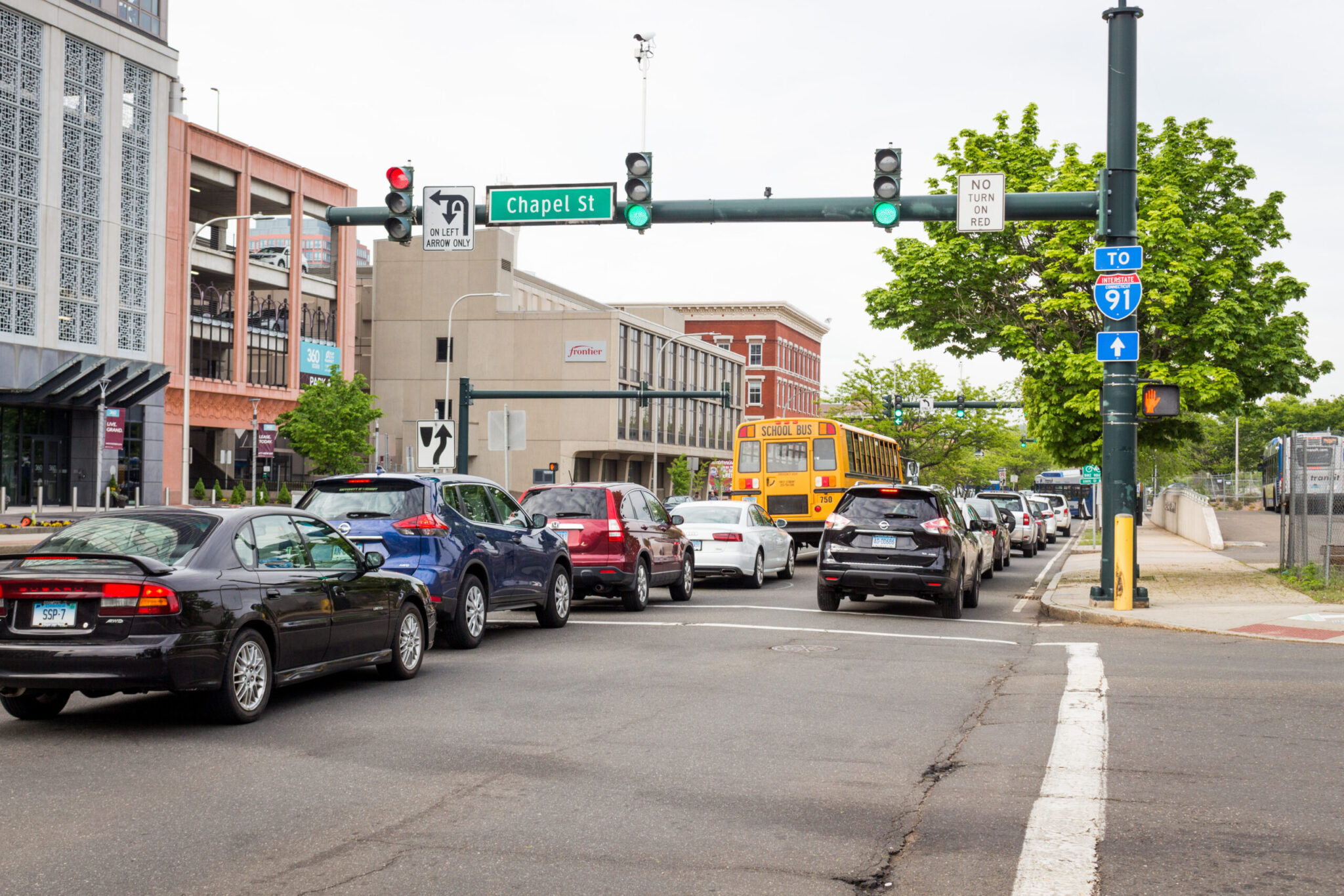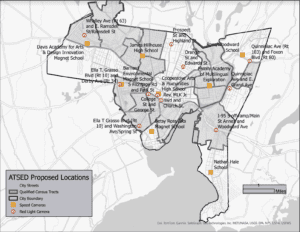New Haven moves to install red light and speed cameras
Mayor Justin Elicker submitted a proposal — which has to be approved by alders and the state — to install 19 automated red light and speed cameras, amid concerns from human rights groups.

Daniel Zhao, Contributing Photographer
New Haven might become the first city in Connecticut to install red light and speed cameras.
Last month, Mayor Justin Elicker submitted an ordinance to the Board of Alders to install 19 cameras across the city. Elicker’s budget proposal, which was submitted on March 1, also allocates funding for the project.
If alders approve it, the city will install 11 red light cameras and eight speed cameras. The system will identify the license plates of cars that ignore red lights or go more than 10 miles per hour above the speed limit. Owners of such cars will receive a $50 ticket for the first offense and $75 tickets for all subsequent ones.
Courtesy of the City of New Haven
“I remember probably 12 or 13 years ago driving to the Capitol to testify myself on the state allowing municipalities to install red light cameras,” Elicker said at the press conference on March 18. “This is a huge milestone.”
Just in 2023, 16 people died in car crashes in New Haven, according to the Connecticut Crash Data Repository. Officially announcing the program, Elicker stood at the corner of South Frontage Road and Park Street, where he said 13 red-light-related crashes happened last year. He expressed hope that cameras will be able to change people’s behavior on New Haven roads and reduce the number of crashes in the city.
Elicker said that the city worked for over a decade to lobby the state to allow the installation of these cameras. Last year, the Connecticut General Assembly passed the bill that allows implementation of automated cameras to combat traffic accidents, but no city in the state has yet installed them.
“We’ve doubled our traffic unit, but we can’t be everywhere,” New Haven Police Chief Karl Jacobson said at the press conference. “This is going to allow us to put these cameras in place, have people ticketed while we’ll also be in other intersections, still doing speed enforcement [and] traffic enforcement.”
The Board of Alders will hold public hearings on the program and can amend the proposed locations for the cameras or other parts of the program. If alders approve the installation of cameras, the project will also have to be approved by the state.
Elicker told the News that he expects cameras to be installed by the end of the next fiscal year, if approved by the alders and the state.
Maximilian Chaoulideer — member of the New Haven Safe Streets Coalition, the group that lobbied the state to allow the use of automated traffic enforcement — wrote that the root cause of traffic violence is the design of the roads and cities, but redesigning them takes time. In the meantime, he believes, automated enforcement presents “the most effective strategy” to deter dangerous driving.
“Since 2019 in New Haven, 50 people have been killed in vehicle crashes, 40 pedestrians have been killed, and four people riding bikes. One measure of success is a reduction of these tragic numbers,” Abigail Roth, another member of the New Haven Safe Streets Coalition, wrote to the News. “Another is people not getting more than one ticket from a camera, showing they changed dangerous driving behavior, which is the goal of the cameras.”
Human rights groups express concerns
The use of red light and speed cameras has been opposed, both nationally and in Connecticut, by human rights groups like the American Civil Liberties Union and the National Association for the Advancement of Colored People.
The groups expressed concerns about the violation of privacy.
At the press conference, Elicker responded that in 2024 cameras are everywhere, and that is the reality of the time we are living in. The mayor told the News that the installed cameras will only be used for ticketing purposes and will not have a face recognition system.
Cameras also ticket the owner of the car, regardless of who was driving it, which the groups say might violate the due process.
Responding to the concern, Elicker said that the already-installed cameras that fine for not paying parking fees work the same way — they ticket the owner of the car, not the person who parked it.
The ACLU and NAACP also cite racial justice threats, as the cameras can be installed predominantly in minority or low-income communities.
“NAACP is adamantly against this,” Scot X. Esdaile, president of the NAACP Connecticut State Conference, told the News. “This is just another way of putting … fines on Black and Brown people.”
Roth credited State Representative Roland Lemar, who championed the bill to allow automated traffic enforcement, for creating safeguards against such abuses.
Elicker said that the state legislation limits the number of cameras that cities can install in any particular neighborhood. Moreover, the red light cameras can only be installed at the intersections where at least two red-light-related crashes happened in the last three years. Speeding cameras are installed only in school zones.
At the press conference, City Transit Director Sandeep Aysola also stressed that automated traffic enforcement systems will help the city avoid “the risk of any bias or escalation that exists when there’s a human being giving the tickets.”
Esdaile believes that the issue is not the placing of cameras in New Haven, but the fact that these cameras are usually installed in cities, which in the United States have higher shares of minority populations.
“You don’t see any red light cameras going up in Greenwich, Connecticut, or any other affluent area in the State of Connecticut,” he said.
Budgeting the project
The city budgeted around $750,000 for the implementation of the program in the mayor’s 2024-25 fiscal year proposal. The mayor proposed adding four new positions to manage the program, with combined salaries totaling around $250,000.
New staff will be implementing the program and reviewing the appropriateness of tickets before the city sends them out, Elicker said.
The rest of the program’s budget, or around $475,000, will be spent on contractual services to install the cameras and other miscellaneous expenses.
The city expects to see an increase in revenue from tickets. In the proposed budget, the city included an estimated additional $700,000 in revenues generated by the program, but Elicker told the News that it is “hard to know exactly” what this number will actually be.
The ACLU and NAACP suggest that automated traffic enforcement creates incentives for the city or contractors to maximize the revenue, instead of pursuing traffic safety.
“This is another way to throw another tax on the people,” Esdaile said. “They’re trying to make money … off the poor people in urban communities, and it’s unfair.”
Elicker claims that the city is not interested in using the tool to collect revenue and the goal of the program is to force drivers to obey the law.
Per the mayor’s budget proposal, New Haven will lose around $50,000 in the next fiscal year on automated cameras. However, the program cost for the coming year includes contracting needed to install the cameras, and will likely go down in subsequent years.
“Typically, in the initial period after the cameras are installed, you will see a lot of tickets given out and then after a period of time the number of tickets given out will dramatically reduce because people will begin to obey the law,” Elicker told the News.
The 2024-25 fiscal year starts on July 1.
Interested in getting more news about New Haven? Join our newsletter!








